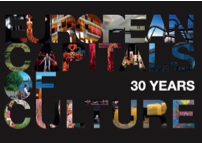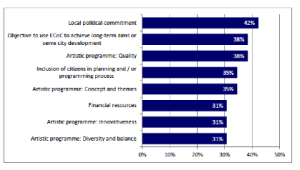In 2015 the famous initiative of European Capitals of Culture celebrates its 30th anniversary!
Conceived by the Greek Ministry of Culture Melina Mercouri in 1983, this European action has evolved over the years, becoming an international festive event but also an important opportunity to promote local and regional development.
The importance of citizenship dimension has emerged over time and it is highlighted also by Decision No 445/2014/Eu of the European Parliament and of the Council of 16 April 2014 establishing a Union action for the European Capitals of Culture for the years 2020 to 2033 and repealing Decision No 1622/2006/EC[1], which states that one of ECOC general objectives is “to safeguard and promote the diversity of cultures in Europe and to highlight the common features they share as well as to increase citizens’ sense of belonging to a common cultural area”; among the specific objectives, we could also find “to widen access to and participation in culture”.
The involvement of citizens has thus become a crucial issue in the ECOC project, in terms of local political commitment, audiences and participants engagement, volunteering, activities for specific target groups. That is more and more encouraging “a stronger commitment towards more closely-defined and locally-sensitive vision statements”[2].
Therefore, balancing local, European and international dimensions is a central challenge for the European Capitals of Culture candidacy process, which should also foster a wide range of impacts, among which the social ones related to public engagement and impacts on individuals and communities.
As a matter of fact, “City and citizens” is one of the two evaluation criteria (the other one is the European Dimension), since the cultural programme should foster the participation of citizens (living in the city, in its surroundings and abroad) as well as be a part of a long term development strategy.
As figure 1 shows, local political commitment and the inclusion of citizens in planning and/or programming process appeared to be among the most important strengths of successful bids in 2001-2012 period.
Figure 1: % of successful bid cities demonstrating particular strengths (2001-2012)
Source: European Capitals of culture: success strategies and long term effects, European Union, 2013[3]
To this end, among the most successful examples we could mention the most recent Capitals such as Marseille 2013, which ensured a high level of citizens’ involvement, who could also co-create cultural events, Kosice 2013, Riga 2014 but also Liverpool 2008, Linz 2009, Essen for the Rhur 2009, Pecs 2010, Turku 2011, Tallinn 2011.
For the new 2020-2033 period, candidate cities should ensure that ECOC is included in a wider cultural strategy able to produce a sustainable legacy at cultural, social and economic level. The citizenship dimension has been strengthened and included in the “outreach” category. According to already mentioned Decision No 445/2014/Eu, the following factors shall be assessed for this purpose:
(a) the involvement of the local population and civil society in the preparation of the application and the implementation of the action;
(b) the creation of new and sustainable opportunities for a wide range of citizens to attend or participate in cultural activities, in particular young people, volunteers and the marginalised and disadvantaged, including minorities, with special attention being given to persons with disabilities and the elderly as regards the accessibility of those activities;
(c) the overall strategy for audience development, and in particular the link with education and the participation of schools.
[1] http://eur-lex.europa.eu/legal-content/EN/TXT/?uri=uriserv:OJ.L_.2014.132.01.0001.01.ENG
[2] http://ec.europa.eu/programmes/creative-europe/actions/documents/30-years-brochure_en.pdf
[3] http://www.europarl.europa.eu/RegData/etudes/etudes/join/2013/513985/IPOL-CULT_ET%282013%29513985_EN.pdf


